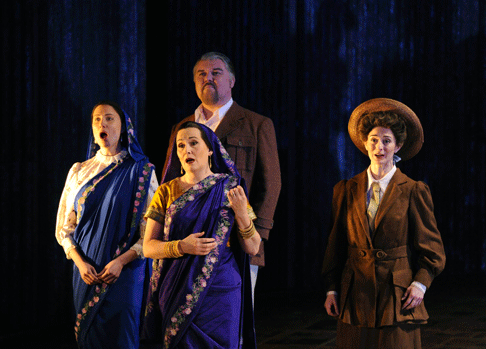Satyagraha doesn’t sound promising in theory, because it’s sung in Sanskrit and Glass’s repetitive monotones drone on shapelessly. But for once, that’s the whole point, that words alone are meaningless. Real change is brought about when people think and act.
The story is set in Gandhi’s youth, when he still believed that conventional, middle class ideas could change things. While he lived in South Africa, he was a facsimile of the British middle class intellectual, agitating through the press, hoping thus to change the entrenched colonial system.His big breakthrough came when he switched to direct action. By swapping his tweed three-piece suit for a simple cotton loincloth, he was making a truly radical statement: you don’t change the power structure by playing its own games.
Glass’s strange repetitive music works perfectly with the theme, too. His cadences hardly vary, so you worry that the musicians will get RSI. Yet listen carefully, and the repeats mutate in microtones, gradually shifting gears, so that when there’s a flight into lyricism, it strikes you all the more. This unrushed monotony is as natural as breathing. Hindus chant the word “Om” endlessly, until the vibration enters their bodies, allowing their minds to float, beyond consciousness. So it is with Glass’s music, informed by other and older traditions than western music.Your focus shifts inwards, beyond outward form.
There was exceptionally idiomatic playing from the ENO orchestra, conducted by Stuart Stratford. When the orchestra took their bows, parts of the audience went wild with enthusiasm. Clearly an audience that knows new music, or accepts it on its own terms. Satyagraha is the biggest selling contemporary opera the ENO has produced.
The text is in Sanskrit, which most people, including Indians, don’t understand. This is deliberate because what Gandhi discovered was that words and meaning aren’t the same thing. Hence the scene from the epic myth of Arjuna. The hero’s enemies are puppets, men with sticks who crumble when moved. Scene titles appear, like chapter headings in books, but what unfolds on stage isn’t narrative. Tolstoy and Tagore appear in panels above the stage. You don’t really need to know who they are, because the idea is that you’ll want to find out more, later.This opera moves outside the box in time and space!
There are so many amazing images in this production that it’s hard to take them all in at once. Some are striking, like the giant puppets that descend menacingly on Gandhi, corralled by bigots singing “hahahaha”. Others are elusive, like the fish which materializes in the second act. It doesn’t matter if we don’t get them all. Like words, images are hints of meaning, not meaning in themselves. Like poetry, meaning is oblique, revealing itrself slowly.
 Stephanie Marshall as Kasturbai Gandhi’s wife, Elena Xanthoudakis as Miss Schlesen Gandhi’s secretary, Janis Kelly as Mrs Naidoo’s Indian co-worker and Ashley Holland Mr Kallenbach’s European co-worker
Stephanie Marshall as Kasturbai Gandhi’s wife, Elena Xanthoudakis as Miss Schlesen Gandhi’s secretary, Janis Kelly as Mrs Naidoo’s Indian co-worker and Ashley Holland Mr Kallenbach’s European co-worker
Because Glass’s music is so unusual, and his text obscure, staging in this opera is even more important than usual. Phelim McDermott, Julian Crouch and Improbable and their team have created a theatrical masterpiece which is sensitive and well-informed.
The staging is so atmospheric that the simple clean lines of the Third Act come as quite a shock. Gandhi sits front stage while a man ascends a ladder. The reference is Martin Luther King. who adapted the principles of Satyagraha to the Civil Rights Movement. At the premiere in 2007, I thought this act was too abrupt a change from the sepia-tinted mystery that had gone before, and that the image of King waving to the clouds was contrived, as if designed for American audiences who might not appreciate how powerful the British Empire once was.Since then, Barack Obama has become President. But have we really”reached the mountain top”?
On the other hand, the spareness of this Act hones in on Alan Oke as Gandhi. Perhaps it’s significant that until this stage in the opera, Oke sings with an ensemble or remains relatively quiet. Now he’s centre focus. He sings two extended “arias”, the first with its references to “athletes of the spirit” who hold steadfast unto death. The second is more lyrical for he’s expressing transcendence. Oke has matured into the part, and is singing with greater depth and dignity than three years ago. He’s in his element now. You don’t need to know the exact words he’s singing, because he conveys their sense with such conviction. Also more comfortable this time, in the role of Miss Schlesen, is Elena Xanthoudakis: whose sings lovely flights of lyrical beauty. Musically, this production is even better than before, superb performances all round. It’s far tighter than the Stuttgart production available on DVD. Let’s hope this one is preserved on film. It’s a classic.
Anne Ozorio
![Alan Oke as M. K. Gandhi [Photo by Alastair Muir/ENO]](http://www.operatoday.com/Satyagraha_011.gif)
